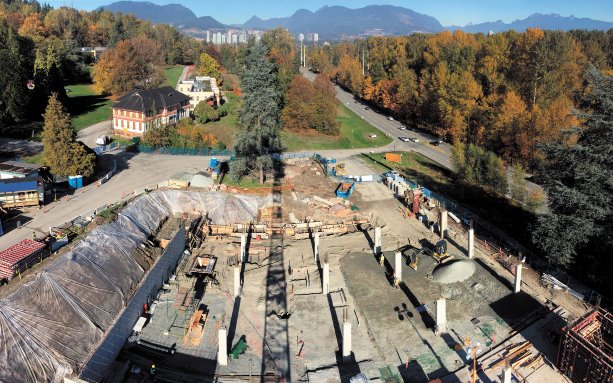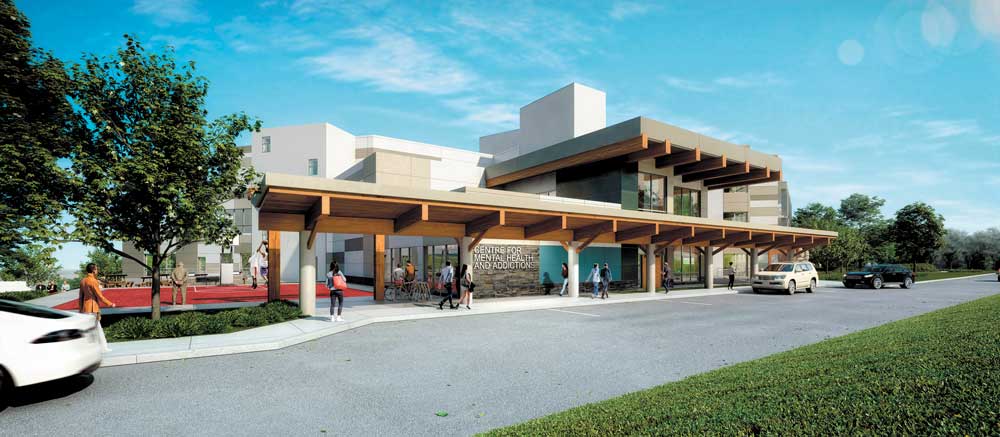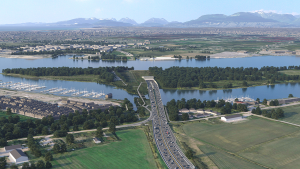Coquitlam, B.C. mayor Richard Stewart wants the new NDP government to have a great vision for Riverview lands development as a mental health centre not what he calls BC Housing’s outdated view.
Stewart’s wants the NDP government to consider new ways of treating and housing those individuals with mental illnesses or addictions or a combination of both. It includes concepts such as an Alzheimer village.
“There are lots of opportunities here,” he says of the now owned B.C. lands that once housed up to 4,200 mental health care residents in 72 buildings and provided jobs for a population of 2,200 but were abandoned in 2012 and now sit virtually empty.
Alzheimer villages are a Dutch concept stemming from the town of Hogewey, a more creative care for those with dementia. The Dutch village includes a grocery store, a theatre and a barber shop and many of the ‘town’ residents are unaware that it is all part of a nursing home for people with severe dementia. The concept has spawned ‘towns’ in Alberta and Ontario.
The town is just one type of accommodation that could occur on Riverview’s 244 acre site as mental health care today is evolving. Stewart believes that Riverview with it hillside views, sweeping lawn, turn of the century architecture and legacy of trees provides an ideal scenario for B.C. to adopt some of these progressive mental health care treatments for a variety of users ranging from dementia to youth with mental health and addiction problems.
Already, the site has two new modern mental health and addiction buildings valued at $175 million rising out of the ground, part of an earlier B.C. Housing study called Renewing Riverview vision. But, the vision cuts the site into three areas: mental health, a town centre with market housing, and an economic zone.
It is a vision that Stewart believes should be kicked to the curb. Stewart and the majority of council have been dead-set against turning the iconic hospital grounds into condos and he wants a new vision.
“The document is enormously out of date because we have different government,” he said of the 2015 issued report. As well, he said, Coquitlam never agreed to the BC Housing vision. The document, which came about after BC Housing’s public consultation, “came as a bit of a surprise” to many local stakeholders as it envisioned a plan that didn’t really fit with the public consultation, he said.
“It (the vision) was really drafted by the previous government,” he said, and not one the Opposition — then the NDP — favoured. The MLA for the Coquitlam is NDP’s Selina Robinson, who is now B.C.’s new Minister of Municipal Affairs and Housing. Stewart said that while Robinson was in Opposition, the BC Housing ‘vision’ was not one her party supported.“I am confident that this current government has a vision for Riverview although we have not seen it,” Stewart said.
If Stewart is looking for innovation, already the two new buildings bring some modernization. PCL Construction Westcoast is constructing a $75 million replacement facility to house two mental health programs now operated out of Burnaby, while EllisDon Construction has a $100 million contract to build a 105-bed Centre for Mental Health and Addiction (CMHA), another replacement building for a structure built in the l950s.

Photo: Courtesy of the B.C. government
PCL’s four-storey Valleyview building, which replaced the demolished Valleyview Pavilion, will be the new home for the 38-bed Maples Adolescent Treatment Centre for youth and the Provincial Assessment Centre. The facility will serve youths with developmental disabilities and concurrent mental health and/or substance abuse disorders. It will provide space for programming, academics, and recreation. PCL is providing a design-build structure, with Partnerships B.C., with a completion date of winter 2018 and occupancy in 2019. The Valleyview structure is to meet a LEED gold standard.
It is the kind of facility that Coquitlam’s Stewart wants to see more of as there is a need in the Lower Mainland for facilities serving youth with mental challenges and these individuals are prone to slip into addictions. “It is only about 40 beds but the question is how do we make it 400?” he said as parents are now struggling to find the community resources.
The new building was designed using innovative software that optimized design features for all stakeholders. Rene Horn, project manager, PCL said: “With our design partner HDR|CEI we have created virtual mockups of the facility interiors. In a 3-D environment, the various user groups can experience the layout, colors, lighting, and adjacencies. It beneficial to figure out locations for outlets, equipment, screens, anything built in. For example, the members of the team care station want to know if they can see all bedrooms without any interference.”
Demolition has been complete at the Unit 8 site on the grounds of the existing building and work has started on the 105-bed CMHA that replaces the existing Burnaby facility, adding 11 beds. EllisDon is slated to complete the facility, designed by Parkin Architects Western Ltd. to meet a LEED Gold standard, by late 2019.
Parkin is renowned for its mental health and health facility design. Cornell Institute for Healthy Futures recently hosted its first roundtable looking at design impact on the physical environment for individuals with mental and behavioral issues and how to develop a more sensitive approach to spaces that support the needs of these patients. Parkin principal, Lynne Wilson Orr was a member of that roundtable discussion held in mid-October.
Communications manager Carol Swan with the Provincial Health Services Authority said the new CMHA facility will have seven wards with each having 15 individual rooms. “It will have some cool features,” said Swan. The structure uses lots of wood, has great views, has two therapeutic gardens, uses art and exercise therapy, color and also features Indigenous art decor.
But, aside from the two buildings construction has halted. BC Housing turned down repeated requests for an interview from the Journal of Commerce. Instead media relations officer Andrea Coutts said via email that a master planning process (based upon the early renewal vision) was underway in 2017, which involved on-going consultation with the City of Coquitlam, interested stakeholders, the community and the general public. “BC Housing has assembled a team of consultants for the master planning process,” she said.
“I can best describe it as a start,” said Craig Hodge, Coquitlam councillor and chair of its Riverview Lands Advisory Committee, of the two mental health buildings. His committee and council favor returning the site to a major mental health facility before the building crumble beyond repair. He calls the continued indecisiveness that plagues the site’s building as “demolition by neglect”.
Opened in 1913, buildings were added and the population peaked in the mid-1950s. “It was a community,” said Hodge with a school, store, post office, fire hall and working farm. Starting in the l980s, there was also a view that mental health patients could better integrate out in the community. While integration works for the majority, Hodge said there is the component that struggles with both drug addiction and mental health issues and strains community resources such as policing. Riverview can play a role in mitigating that.
BC Housing’s vision also sets out a break-even financial mandate for regenerating the site. Funds generated from economic opportunity would help defray the costs of preserving the buildings, infrastructure, providing community facilities, and preserving the sites natural spaces. It’s a mandate that concerns individuals like Hodge. According to BC Housing, the East Lawn building restoration, the largest on site at 3,300 square feet, is estimated at $25 million and would take the construction of 450 townhouse units selling for $475,000 or 500 condominiums selling at $320,000 to break even.
The vision of renewing Riverview is also blurred by the Kwikwetlam First Nation (KFN), a small band of less than 100 members, which has launched a B.C. Supreme Court challenge to the title rights of the Riverview grounds, Gates Park in Port Coquitlam and part of the Colony Farm, now a Metro Vancouver park. The KFN did not respond to requests for an interview, but band lawyer Karey Brooks said the band was currently in negotiations with the government. The band’s suit was still in place pending the outcome.
According to documents filed with the BC Housing, the band’s concern is establishing economic long-term benefits to sustain the band. The KFN, in addendum to the BC Housing vision report, said it would “expect to see significant market development at Riverview” and wants to either own the businesses developed on site or gain economic benefits from them. The KFN (which also wants partnerships with demolishing, remediation, and environmental companies working on Riverview) maintains it has construction expertise and is in the final stages of developing a 120 acre industrial and commercial site on its lands.
BC Housing has entered into several agreements with the band, including a 2016 procurement directive to ensure it maintains the opportunity to benefit on the Riverview lands.











Recent Comments
comments for this post are closed